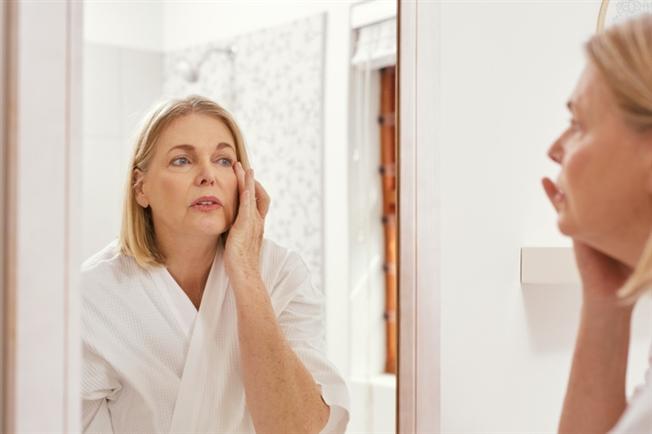Fight back against skin changes during menopause

With the onset of menopause comes numerous, unwanted changes to a woman’s skin. From the acne we thought we left behind in our teenage years, to thinning and dry skin, to the excessive growth of facial hair, what’s a woman to do?
“Skin changes during menopause are due to hormonal changes and fluctuations, typically beginning in a woman’s 40s,” says Lynn M. Klein, MD, dermatologist at Lankenau Medical Center, part of Main Line Health. “Fortunately, there are a multitude of options available to effectively combat these concerns.”
The effects of sun exposure
We all know that the sun can cause skin damage.
“During menopause, some women experience more pigmentation on their face, called melasma, which is modeled pigmentation on the cheeks, upper lip and forehead,” says Dr. Klein. “This is caused by a combination of hormonal changes and sun exposure. Whether male or female, we’re all experiencing more photo damage due to the depletion of ozone layer.”
A powerful weapon
“The most important anti-aging cream or antioxidant you can possibly use on a daily basis—no matter what the weather, no matter what color your skin color—is a broad-spectrum sunscreen,” says Dr. Klein. “Waking up every morning and applying a sunscreen to your face, or a moisturizer with sunscreen, will prevent many of the changes that we experience with photo aging.”
Ceramides and retinoids
As we grow older, our skin gets thinner and tends to dry out.
“Women need to repair their epidermis,” says Dr. Klein. “I love moisturizers that contain ceramides, as well as a broad-spectrum sunscreen. And I recommend any of the retinoids, whether they’re prescription or over-the-counter. Retinoids are derivatives of vitamin A. They definitely slow down photo aging and repair the epidermis by stimulating new collagen growth.”
Morning vs. night
Should your regimen differ between morning and night? The answer is yes. Use the retinoids in the evening, very sparingly. If needed, you can add a moisturizer on top. In the morning, Dr. Klein recommends applying a moisturizer with a broad-spectrum sunscreen.
Battling acne
“During menopause, women begin breaking out with acne on the lower section of the face, as opposed to the teenage T-zone,” explains Dr. Klein. “There are many over-the-counter cleansers available, but they tend to be irritating for mature skin because they contain salicylic acids or benzoyl peroxides. We have better prescription cleansers and medications for adult hormonal acne. Depending upon the severity of a woman’s acne, we can offer oral antibiotics, hormonal therapy, low-dose oral contraceptive pills that often help with adult hormonal acne, as well as spironolactone, which is another prescription medication. And there are many topical medications, for example metronidazole, as well as medications that contain azeleic acid.”
Unwanted hair
Dr. Klein also says that there are many ways to remove excessive facial hair. “I tell my patients you can go from the least expensive to the most expensive, including over-the-counter depilatory creams, plucking, waxing or shaving,” she says. “Or there is laser hair reduction, which is extremely effective and a godsend for many of my patients. Today, we have wonderful technology with laser hair reduction for all skin colors.”
Dr. Klein says that while certain ethnicities have a higher tendency to develop some skin changes during menopause, and some can run in families, all women can experience these concerns. Talk to your healthcare provider about any menopausal changes affecting your skin. We have the answers!
 Content you want, delivered to your inbox
Content you want, delivered to your inbox
Want to get the latest health and wellness articles delivered right to your inbox?
Subscribe to the Well Ahead Newsletter.
